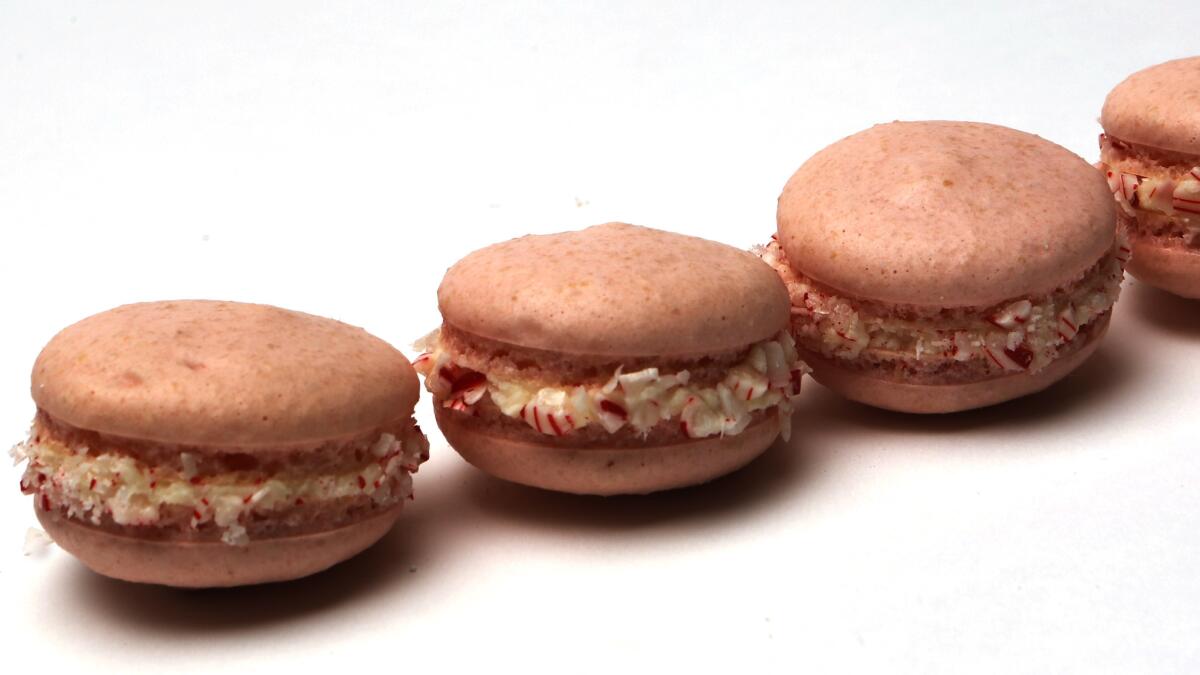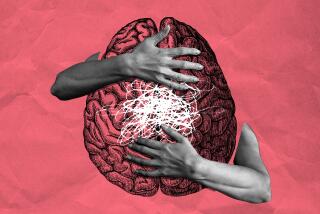Scientists scan the brain to see how stress undermines your diet

It’s hard for stressed people to choose healthful foods over tasty ones, a new study says.
If you’re trying to lose weight, kick off your diet by relaxing. Stress tinkers with your brain chemistry in ways that make it hard to make healthful food choices and maintain self-control, a new study finds.
Study volunteers who endured a somewhat stressful experience were 24% more likely to choose unhealthful snacks afterward compared with volunteers who hadn’t experienced stress. And researchers think they know why: Brain scans showed that the stressed people had altered neurological connectivity between regions of the brain that process tastiness, make value judgments and plan for long-term goals.
“Being able to regulate and control your decision-making involves this complex interplay between different areas of your brain,” said Todd Hare, a neuroscientist at the University of Zurich and the senior author of the study published Wednesday in the journal Neuron. “There’s not just one region or node [of the brain] that turns on and off to establish self-control; they have to all sync up and work in unison. Stress disrupts that synchrony.”
To figure this out, Hare and his colleagues enlisted 51 male volunteers, all of whom had said that they were trying to eat better and stay fit but that they occasionally indulged in some junk food.
Half the men were randomly selected to undergo a moderately stressful experience: immersing their hands in ice water for three minutes while a researcher videotaped them. The other men put their hands in room-temperature water for three minutes, with a researcher in the room but without a video camera rolling. Afterward, all the participants filled out a questionnaire to rate their level of stress during the experience.
Though soaking your hands in ice water may not sound like a big deal, previous studies have shown it produces about the same amount of stress as arguing with a co-worker or spouse, having to make a presentation at work, or getting stuck in traffic when you’re already running late, Hare said.
Next, the volunteers were presented with a series of two food options on a computer screen and asked to choose the one that was more healthful. (Options included cookies, chips, apples and kiwis.) Then the computer presented a pair of foods and randomly selected one of them to recommend to the volunteer to eat. The volunteer could either accept the recommendation or override it and choose the other option, knowing that at the end of the study he would be required to eat the food he chose.
The stressed volunteers went for the tastier, less healthful food more often than their unstressed counterparts.
As the volunteers were making their decisions, the researchers studied the volunteers’ brain activity with functional magnetic resonance imaging, fMRI, scanners. They also took samples of their saliva to measure their levels of the stress hormone cortisol.
The researchers found that stress changes the way different parts of the brain communicate with one another. A simple way to think of it is like “phone line connections between the brain regions,” Hare said. “You could have a better or worse signal coming across that connection.”
The hormone cortisol dialed up the activity from the part of the brain that processes tastiness and strengthened connections between that area and the part of the brain that manages value judgments and decision-making. “So you have a region shouting about taste, and it’s coming through loud and clear,” Hare said.
In addition, the more stress participants felt, the weaker the connections between the part of the brain that deals with long-term planning and the part that manages value judgments and decision-making. That meant their long-term goal of improving their diet was less of a factor in decision about what to eat.
The results are in line with previous research, which has shown that stress leads people to eat more high-calorie foods. They are also highly relevant to the way Americans now live, experts said.
“So many Americans are under chronic stress,” said Stephanie Preston, a behavioral neuroscientist at the University of Michigan who was not involved with the research. “People are working more and more hours, and their vacation time is getting smaller and smaller. They’re also getting rapidly more obese.”
The findings underscore that resolving to eat better without changing your lifestyle probably won’t help, she said.
“Adding ‘I should lose weight’ to your to-do list is going to make people even more stressed, which directly undermines the goal of becoming healthier,” she said.
Instead, would-be dieters should start by reducing the stress in their lives, experts said. It’s also helpful to set up your environment to reduce temptation – for example, keeping only healthful snacks around the house. That way when stressful moments hit, brain chemistry will be less likely to override good intentions.
“You’d be better off not trying to go on a diet or follow a rigid plan, but to actually reduce stress in your life, which would feed back to make healthy eating easier,” Preston said.
For more science news, follow me on Twitter @sasha_hl and “like” Los Angeles Times Science & Health on Facebook.






